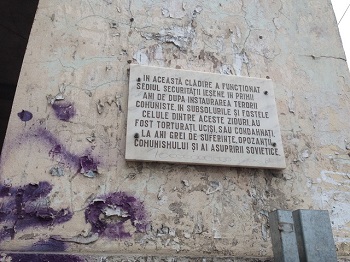
October 2015, Iasi
The head office of the local secret police was based in this building in the early years of the communist regime. In the cellar and what used to be the cells behind these walls, dissidents and members of the opposition were tortured, killed, or convicted to long years of suffering. Unlike them, the building survived.

it is true that unlike those victims the walls had remained but I think this case is lucky and at least some memory is left of what happened, but many massacres and killing went down in history not leaving any traces and memory of victims at all, so sometimes walls and places remain like Auschwitz but they are just for display as I think brutality and inclination to killing is in human nature so when the next event takes place it is just a matter of time I think.
I think the plaque has an interesting message not just for the building but the way events and people can impact society and history. Events can happen in history, people can die or villages can get destroyed by war but there is always something left behind. In this example it’s the building but the things that happened there still go down in history as terrible things. In the world there are many monuments that help representing something that happened in the past. Whether it’s a big event, person, or something small there is always something left behind that shares a memory to that item.
Interesting photo — When looking at it, and reading the caption, I couldn’t help but think of all the places we let live on, even though terrible things occurred there. For example, Auschwitz still stands, and is even a World Heritage Site. Now, our history and our past are obviously important, but could we not remember without the physical building?
Why do we let the building stand? To serve as a memorial? It’s interesting how we keep them around even though they stand for so much suffering.
So I am the one trying to forgive because of MY desire of giving peace (?) to a mind long gone (sounds rather impossible, doesn’t it) and I pronounce this to be an act on someone else’s behalf? Why not assume the forgiving in my own name? Who made me a proxy? Where’s the power of attorney coming from?
Not quite. You (try to) put yourself in someone else’s shoes – someone who lived through something traumatic, like torture or persecution by an oppressive regime. And you imagine what it would be like to forgive on their behalf, while ‘being’ them, as it were. (Without a legitimacy problem). All hypothetical of course, and all because of some deep-seeded desire to imagine a future for them. (A future outside their trauma, beyond the past). The problem is, you wouldn’t really BE them, so you could never really know if that forgiveness would be at all possible, or even desired. It isn’t so much that you would not be legitimate (as a proxy), but that you COULD not really be one. I guess it’s all a case of wishful thinking. Don’t ask where all this comes from.
Q1: There seem to be two really different questions here. Can we?… In my opinion, we cannot. Not on anybody else’s behalf, I mean. We may be able to forgive, of course, but I suspect it is always in our own name and, surely, to our own benefit. Very personal matter indeed.
The second part of Q1: Should we..? I would say there’s no place for obligations or duties in the realm of how we feel about something.
I seem to have misplaced my comment. It was intended as a response to the “Ethics of Memory” first question. Of course, the Romanian Secret Police would also be a good case study for the limits of forgiveness…
Very personal matter indeed, this whole business of forgiveness (as raised in my September blog about ‘the ethics of memory’). Trouble is, we might need to (try and) forgive on others’ behalf, out of some personal feeling rather than ‘obligation’ or sense of duty. (A personal feeling could be, for instance, a deep desire to give someone long gone the peace of mind they could not earn for themselves, while still here). There is no room for duties, of course, in the realm of feelings. Furthermore, I’d argue that there is no room for duties in the realm of moral conscience, either. At the risk of causing a whole scandal amongst my older and wiser, traditional brethren…
PS. True forgiveness is over utterly unforgivable matters. Or else, it is ‘pure’ settlement.